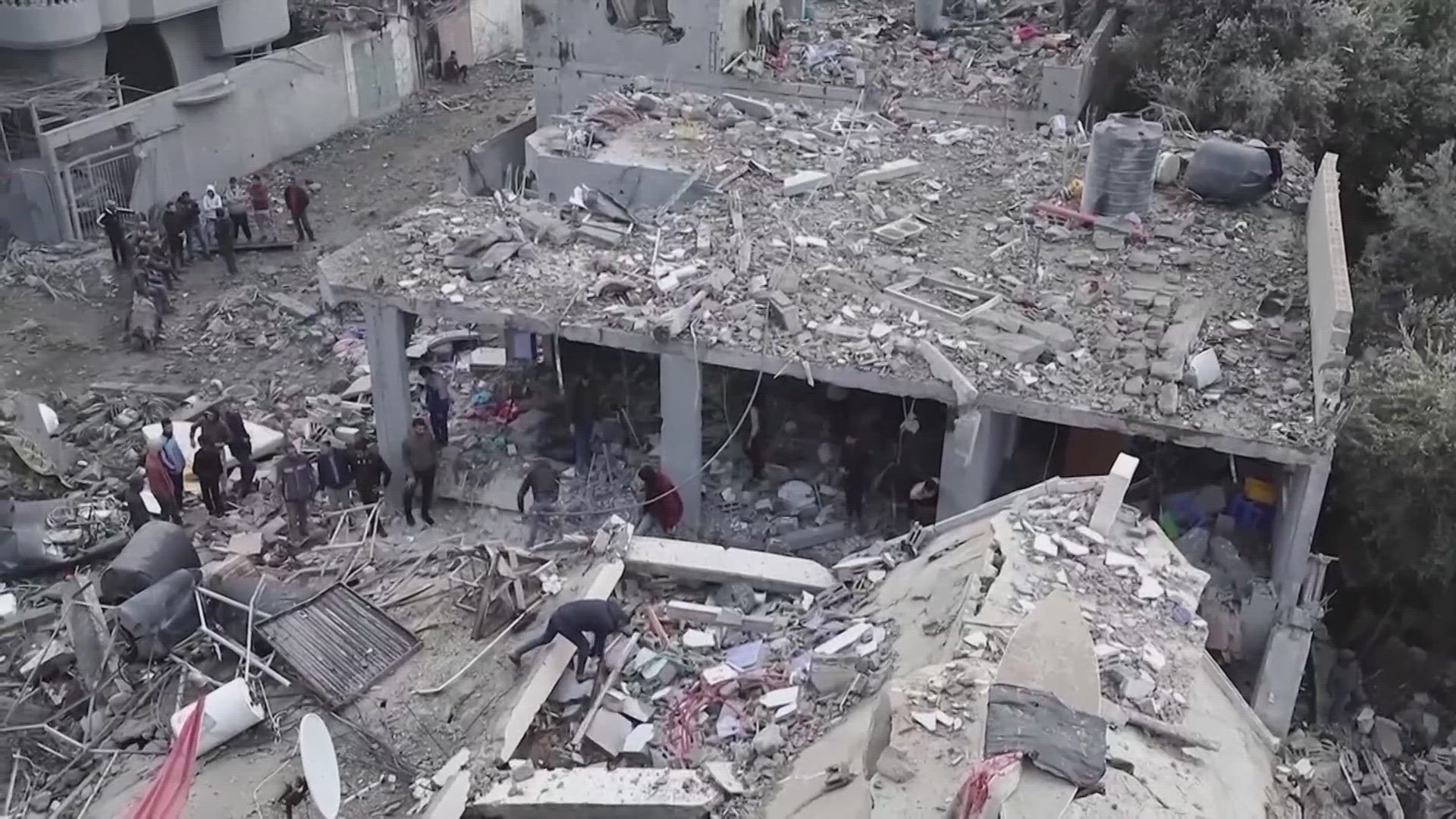RAFAH, — Israel launched heavy strikes across central and southern Gaza overnight and into Wednesday after broadening its offensive against Hamas to more areas where the military had told Palestinians to seek shelter earlier in the war.
Residents reported heavy bombing in the built-up Bureij refugee camp in central Gaza, in the southern city of Khan Younis and in the southern town of Rafah, areas where tens of thousands have sought refuge as much of northern Gaza was pounded to rubble.
“It was a night of hell. We haven’t seen such bombing since the start of the war,” said Rami Abu Mosab, speaking from the Bureij camp, where he has been sheltering since fleeing his home in northern Gaza.
He said warplanes flew overhead and gunfire and explosions echoed from the eastern edge of the camp — which, like others in Gaza, houses refugees from the 1948 war surrounding Israel's creation and their descendants and now resembles other densely populated neighborhoods.
A home near Abu Mosab's shelter was hit, but no one was able to reach the area, he said. Mobile phone and internet service was down for several hours before being gradually restored on Wednesday, the latest of several such outages that have complicated rescue efforts.
With much of northern Gaza leveled, Palestinians fear a similar fate awaits other areas, including Khan Younis, where Israeli forces launched ground operations in early December, and a cluster of built-up refugee camps in central Gaza where the focus has shifted this week.
The military’s latest evacuation orders cover an area of central Gaza that was home to nearly 90,000 people before the war and now shelters more than 61,000 displaced people, mostly from the north, according to the U.N. humanitarian office.
Israel has said the bombing campaign and ground offensive are necessary to dismantle Hamas and prevent a repeat of its Oct. 7 attack, in which militants broke through Israel’s formidable defenses and killed some 1,200 people — mostly civilians — and abducted around 240. An estimated 129 remain in captivity after dozens were freed.
Achieving its goals, Israel has said, will take “many months.”
DEATH, DISPLACEMENT AND STARVATION
Its offensive is already one of the most devastating military campaigns in recent history. More than 21,100 Palestinians, most of them women and children, have been killed, including nearly 200 people in the last 24 hours, according to the Health Ministry in Hamas-ruled Gaza. The count doesn’t differentiate between civilians and combatants.
Some 85% of Gaza's population of 2.3 million Palestinians have fled their homes, crowding into smaller and smaller areas in recent weeks as the ground offensive has expanded. For many Palestinians, the exodus has echoes of the mass displacement in 1948 that they refer to as the Nakba, or catastrophe.
U.N. officials say a quarter of the territory’s population is starving under Israel’s siege, which allows in a trickle of food, water, fuel, medicine and other supplies. Last week, the U.N. Security Council called for immediately speeding up aid deliveries, but there has been little sign of change.
U.S. calls for Israel to curb civilian casualties, and international pressure for a cease-fire, have also had little effect.
Israel blames Hamas for the high civilian death toll in Gaza because the militants operate in dense, residential areas. The military says it has killed thousands of militants, without presenting evidence, and that 164 of its soldiers have been killed since the ground offensive began.
STRIKES IN LEBANON, WEST BANK
The war has ignited other fronts across the Middle East.
Israel and Lebanon's Hezbollah militant group have repeatedly traded fire along the border. An Israeli strike on a family home overnight killed a Hezbollah fighter, his brother and his sister-in-law, local officials and state media said Wednesday. Another family member was wounded.
In the occupied West Bank, Israeli forces killed at least six Palestinians during an overnight raid in the built-up refugee camp of Nur Shams, according to the Palestinian Health Ministry. More than 300 Palestinians have been killed in the West Bank since the start of the war, mostly in confrontations with Israeli forces during raids and protests.
As fears of a wider conflict mount, the U.S., Qatar and Egypt have been working on a new agreement to release more hostages. U.S. President Joe Biden spoke with the ruling emir of Qatar on Tuesday.
Hamas says no more hostages will be released until Israel ends the war, and that it will trade the remaining captives for large numbers of Palestinian prisoners, including high-profile militants. Israel has rejected both demands.
Egypt has floated a proposal to end the war that would include the release of all hostages held in Gaza and all Palestinians imprisoned by Israel, as well as the establishment of a government of Palestinian technocrats to administer Gaza and the occupied West Bank.
It has received a cool reception from both sides, but neither rejected it outright.
___
Shurafa reported from Deir al-Balah, Gaza Strip, and Magdy from Cairo.

